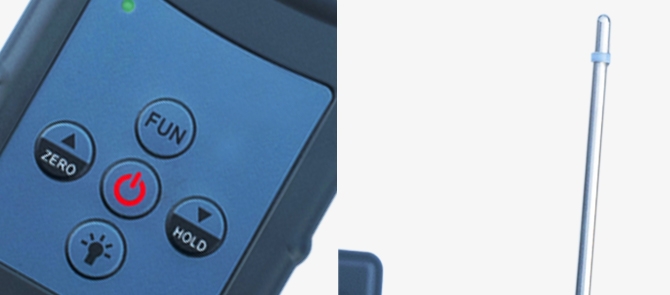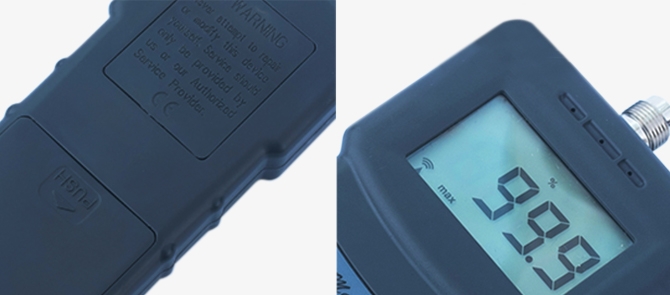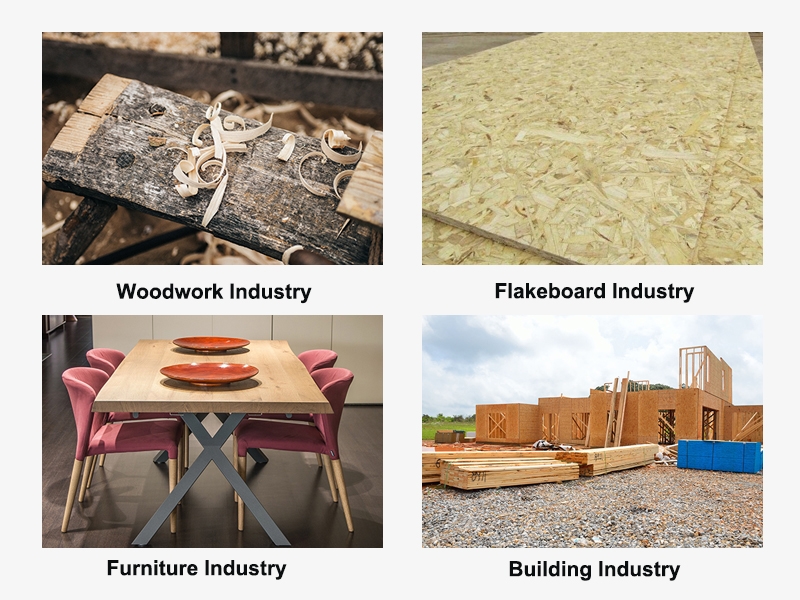A concrete moisture meter is a handheld or portable device used to measure the moisture content within concrete structures. It employs various techniques such as electrical impedance or capacitance to gauge the moisture level, helping prevent issues like mold growth, deterioration, and structural damage.
Features
- Data hold function and low battery alert.
- Concrete moisture meter can testing 10 kinds of materials with different codes.
- It is portable, compact, easy to use and the moisture measurement readings are instant.
- Digital display with back light gives exact and clearly reading although you stay at the somber conditions.
- The moisture meter operates by high-frequency principle and has automatic temperature compensation.

LCD display/Operation area
- Concrete moisture meter with a backlight LCD technology clear display, and low power consumption.
- Microprocessor control, concrete moisture tester built-in program automatic protection measures, good stability.

Probe type sensor/Power Supply
- Wide working range, probe type sensor can be used for in-depth measurement of materials.
- The power supply of the moisture detector is equipped with 4 No.7 batteries.
Applications
The moisture meter, also known as the moisture detector, is an instrument that can quickly measure the moisture content. It is used for the moisture control of raw materials, production process, laboratory final quality control and other links in various industries such as food, chemical, plastic, agriculture and forestry.

| Model | MS300 | |
| Display | 4 digital LCD | |
| Measuring Range | 0-70% | |
| Operating Conditions | Temperature: 0-60 °C | Humidity: 5%-90% RH |
| Accuracy | ± 0.5 (main moisture range) | |
| Operation | electrical resistance method, automatic temperature compensation | |
| Power Supply | 4x1.5 AAA size (UM-4) battery | |
| Dimension | main unit 140 mm×60 mm×22 mm | |
| Net Weight | 120g (not including batteries) | |
Q1: How does a moisture meter work?
A1: The portable moisture detector is composed of a capacitance sensor, C/V conversion circuit, A/D converter and LCD digital display circuit. After the capacitance sensor is scooped into the tested grain, the medium is a variety of different grains tested. Since the dielectric constant of water is much larger than that of general substances, a small change in the measured grain water content will cause a large change in the capacitance of the sensor. Through the C/V conversion circuit and A/D converter, the LCD digital circuit directly shows the percentage of the measured grain water content.
Q2: What are the types of moisture meters?
A2: A moisture meter (moisture tester) is a measuring instrument for moisture content that can quickly determine the moisture content of a substance. Commonly used moisture meters include chemical moisture meters, paper moisture meters, infrared moisture meters, grain moisture meters, building materials moisture meters, mortar moisture meters, crack moisture meters, soil moisture meters and wood moisture meters.
Q3: Why need a moisture meter?
A3: A moisture meter is essential for measuring the moisture content of materials, especially in fields like agriculture, construction, and woodworking. It helps prevent issues like mold, decay, and structural damage by ensuring optimal moisture levels. In agriculture, it aids in determining the right time for planting and harvesting. For construction, it prevents damage due to excessive moisture in building materials. In woodworking, it prevents warping or cracking of finished products. By providing quick and accurate moisture readings, moisture meters enable informed decisions, efficient processes, and the preservation of quality and safety across various industries.
Tips: How to choose a moisture meter?
- Determine Your Application. Consider what you'll be using the moisture meter for. Moisture meters are used in various industries such as woodworking, construction, agriculture, and home inspection. Different applications might require specific types of moisture meters.
- Type of Material. Identify the type of material you'll be measuring moisture in. Moisture meters are designed for specific materials like wood, concrete, drywall, grains, and more. Make sure the moisture meter you choose is suitable for the material you'll be working with.
- Measurement Range. Check the measurement range of the moisture meter. It should cover the expected moisture levels of the material you'll be testing. Some meters are better suited for dry materials, while others are designed for high-moisture environments.
- Measurement Depth. Consider how deep you need to measure moisture. Some meters offer different penetration depths, which can be crucial if you need to assess moisture levels at different depths within a material.
Thank you for buying industrial test and measurement equipment on SISCO.com, all products sold by SISCO and the partner cover a 12 months warranty, effective from the date of receiving the products.
What is covered?
SISCO is responsible for providing free spare parts, and free technical support to assist the customer to repair the defective products until the problem is solved.
What is not covered?
- Product purchased from anyone other than a SISCO store or a SISCO authorized reseller.
- Expendable parts.
- Routine cleaning or normal cosmetic and mechanical wear.
- Damage from misuse, abuse or neglect.
- Damage from use of parts other than SISCO approved.
- Damage from use outside the product’s usage or storage parameters.
- Damage from use of parts not sold by SISCO.
- Damage from modification or incorporation into other products.
- Damage from repair or replacement of warranted parts by a service provider other than a SISCO authorized service provider.
- Damage caused by the application environment not meeting the product usage requirements and the failure to perform preventive maintenance.

